Consequences of Brexit on Human Rights and Employment Laws
VerifiedAdded on 2020/07/22
|8
|1901
|36
AI Summary
The assignment provides a detailed examination of the English Legal System, structured into criminal and civil branches. The report outlines the functioning of courts within each branch, highlighting their specific procedures: civil cases are managed in county courts, court of appeal, and high court; criminal cases progress through magistrate courts, court of appeal, and crown court. It further delves into the sources of English law such as common law, case law, delegated legislation, and European Union law, with particular attention to their applications and implications. The impact of Brexit on legal and economic stability, particularly concerning human rights and employment, is also critically analyzed.
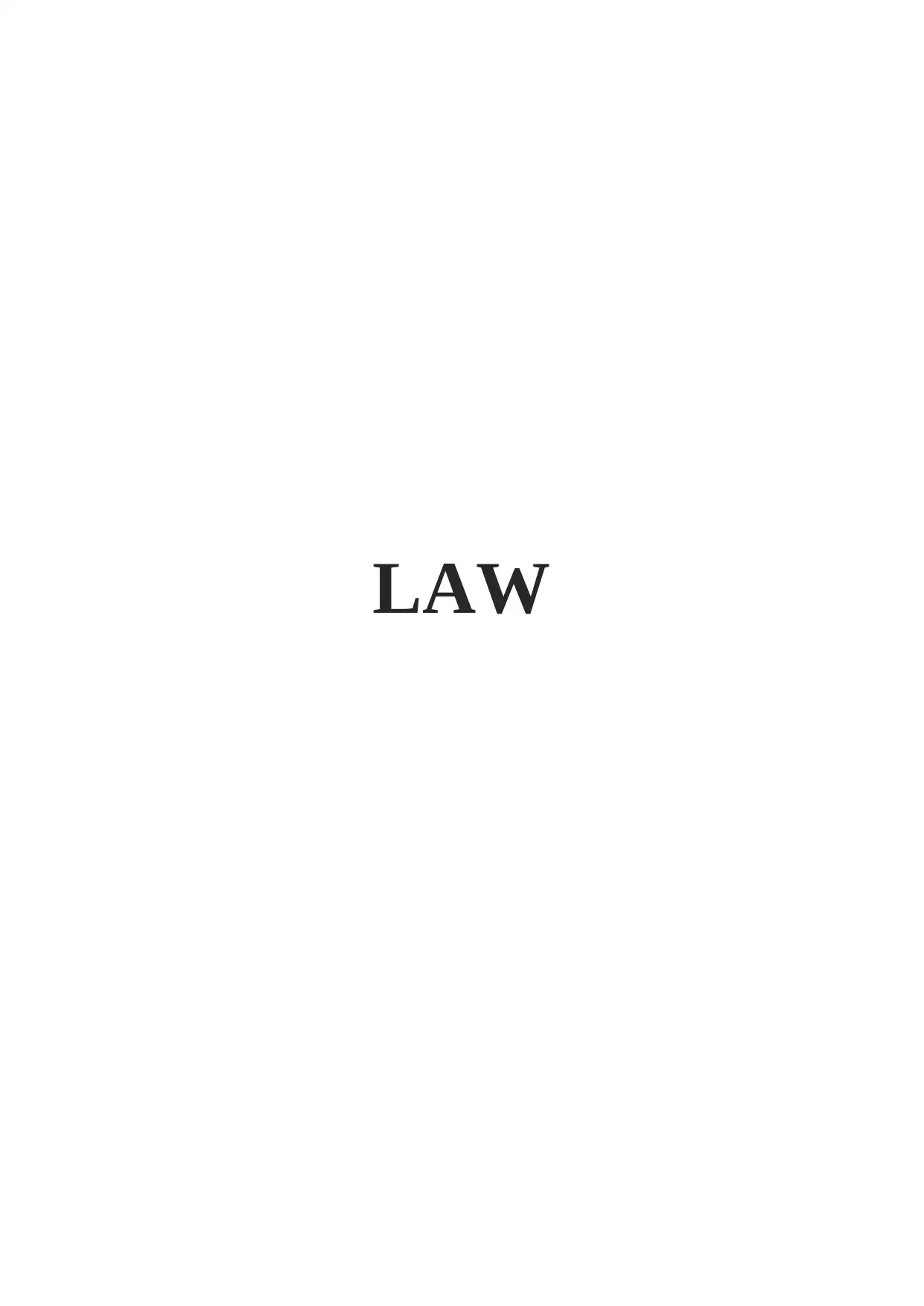
LAW
Paraphrase This Document
Need a fresh take? Get an instant paraphrase of this document with our AI Paraphraser


Table of Contents
INTRODUCTION.................................................................................................................................4
MAIN BODY........................................................................................................................................4
Different types of sources of law in English legal system with examples..........................................5
CONCLUSION.....................................................................................................................................7
REFERENCES......................................................................................................................................8
INTRODUCTION.................................................................................................................................4
MAIN BODY........................................................................................................................................4
Different types of sources of law in English legal system with examples..........................................5
CONCLUSION.....................................................................................................................................7
REFERENCES......................................................................................................................................8
⊘ This is a preview!⊘
Do you want full access?
Subscribe today to unlock all pages.

Trusted by 1+ million students worldwide
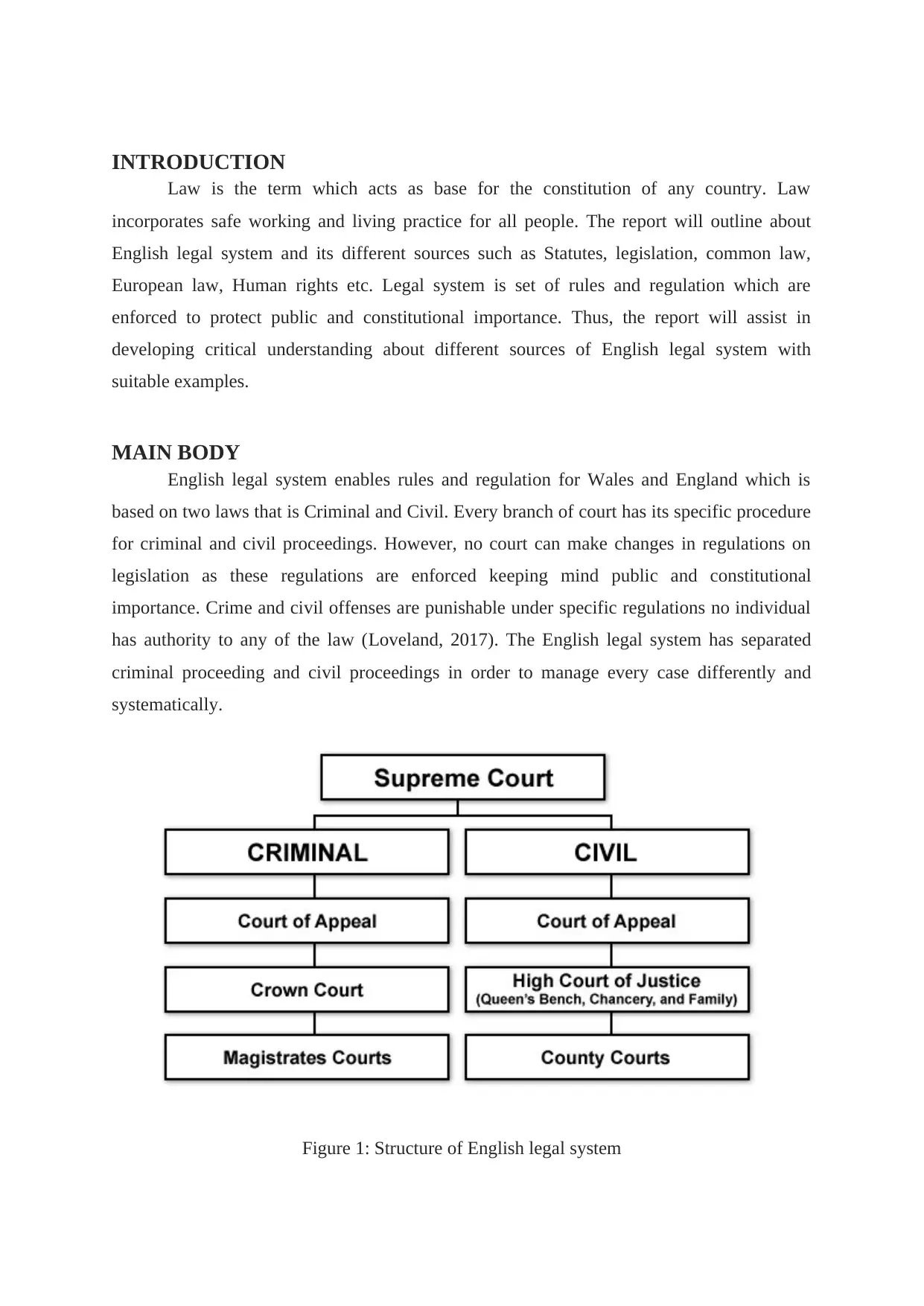
INTRODUCTION
Law is the term which acts as base for the constitution of any country. Law
incorporates safe working and living practice for all people. The report will outline about
English legal system and its different sources such as Statutes, legislation, common law,
European law, Human rights etc. Legal system is set of rules and regulation which are
enforced to protect public and constitutional importance. Thus, the report will assist in
developing critical understanding about different sources of English legal system with
suitable examples.
MAIN BODY
English legal system enables rules and regulation for Wales and England which is
based on two laws that is Criminal and Civil. Every branch of court has its specific procedure
for criminal and civil proceedings. However, no court can make changes in regulations on
legislation as these regulations are enforced keeping mind public and constitutional
importance. Crime and civil offenses are punishable under specific regulations no individual
has authority to any of the law (Loveland, 2017). The English legal system has separated
criminal proceeding and civil proceedings in order to manage every case differently and
systematically.
Figure 1: Structure of English legal system
Law is the term which acts as base for the constitution of any country. Law
incorporates safe working and living practice for all people. The report will outline about
English legal system and its different sources such as Statutes, legislation, common law,
European law, Human rights etc. Legal system is set of rules and regulation which are
enforced to protect public and constitutional importance. Thus, the report will assist in
developing critical understanding about different sources of English legal system with
suitable examples.
MAIN BODY
English legal system enables rules and regulation for Wales and England which is
based on two laws that is Criminal and Civil. Every branch of court has its specific procedure
for criminal and civil proceedings. However, no court can make changes in regulations on
legislation as these regulations are enforced keeping mind public and constitutional
importance. Crime and civil offenses are punishable under specific regulations no individual
has authority to any of the law (Loveland, 2017). The English legal system has separated
criminal proceeding and civil proceedings in order to manage every case differently and
systematically.
Figure 1: Structure of English legal system
Paraphrase This Document
Need a fresh take? Get an instant paraphrase of this document with our AI Paraphraser
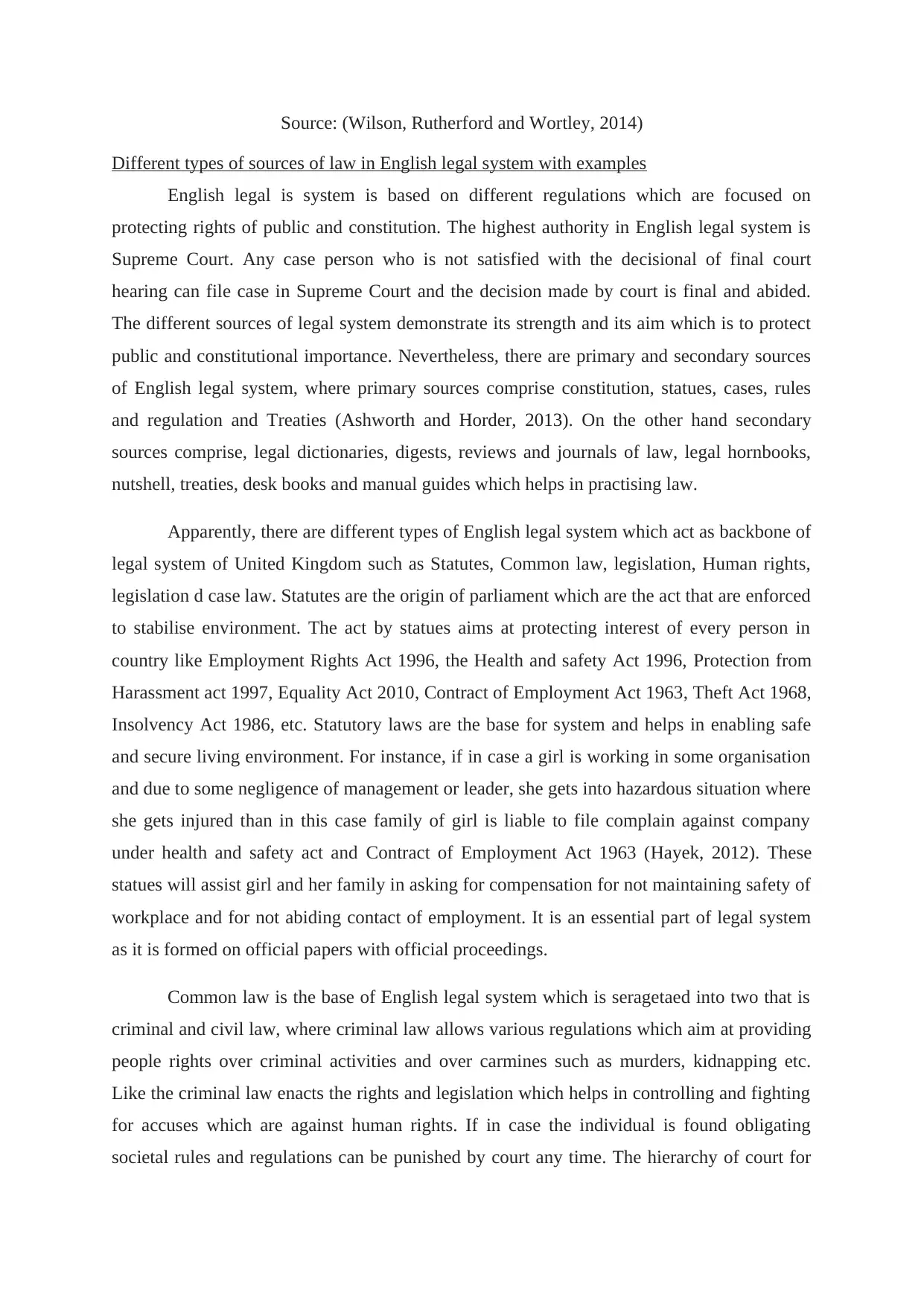
Source: (Wilson, Rutherford and Wortley, 2014)
Different types of sources of law in English legal system with examples
English legal is system is based on different regulations which are focused on
protecting rights of public and constitution. The highest authority in English legal system is
Supreme Court. Any case person who is not satisfied with the decisional of final court
hearing can file case in Supreme Court and the decision made by court is final and abided.
The different sources of legal system demonstrate its strength and its aim which is to protect
public and constitutional importance. Nevertheless, there are primary and secondary sources
of English legal system, where primary sources comprise constitution, statues, cases, rules
and regulation and Treaties (Ashworth and Horder, 2013). On the other hand secondary
sources comprise, legal dictionaries, digests, reviews and journals of law, legal hornbooks,
nutshell, treaties, desk books and manual guides which helps in practising law.
Apparently, there are different types of English legal system which act as backbone of
legal system of United Kingdom such as Statutes, Common law, legislation, Human rights,
legislation d case law. Statutes are the origin of parliament which are the act that are enforced
to stabilise environment. The act by statues aims at protecting interest of every person in
country like Employment Rights Act 1996, the Health and safety Act 1996, Protection from
Harassment act 1997, Equality Act 2010, Contract of Employment Act 1963, Theft Act 1968,
Insolvency Act 1986, etc. Statutory laws are the base for system and helps in enabling safe
and secure living environment. For instance, if in case a girl is working in some organisation
and due to some negligence of management or leader, she gets into hazardous situation where
she gets injured than in this case family of girl is liable to file complain against company
under health and safety act and Contract of Employment Act 1963 (Hayek, 2012). These
statues will assist girl and her family in asking for compensation for not maintaining safety of
workplace and for not abiding contact of employment. It is an essential part of legal system
as it is formed on official papers with official proceedings.
Common law is the base of English legal system which is seragetaed into two that is
criminal and civil law, where criminal law allows various regulations which aim at providing
people rights over criminal activities and over carmines such as murders, kidnapping etc.
Like the criminal law enacts the rights and legislation which helps in controlling and fighting
for accuses which are against human rights. If in case the individual is found obligating
societal rules and regulations can be punished by court any time. The hierarchy of court for
Different types of sources of law in English legal system with examples
English legal is system is based on different regulations which are focused on
protecting rights of public and constitution. The highest authority in English legal system is
Supreme Court. Any case person who is not satisfied with the decisional of final court
hearing can file case in Supreme Court and the decision made by court is final and abided.
The different sources of legal system demonstrate its strength and its aim which is to protect
public and constitutional importance. Nevertheless, there are primary and secondary sources
of English legal system, where primary sources comprise constitution, statues, cases, rules
and regulation and Treaties (Ashworth and Horder, 2013). On the other hand secondary
sources comprise, legal dictionaries, digests, reviews and journals of law, legal hornbooks,
nutshell, treaties, desk books and manual guides which helps in practising law.
Apparently, there are different types of English legal system which act as backbone of
legal system of United Kingdom such as Statutes, Common law, legislation, Human rights,
legislation d case law. Statutes are the origin of parliament which are the act that are enforced
to stabilise environment. The act by statues aims at protecting interest of every person in
country like Employment Rights Act 1996, the Health and safety Act 1996, Protection from
Harassment act 1997, Equality Act 2010, Contract of Employment Act 1963, Theft Act 1968,
Insolvency Act 1986, etc. Statutory laws are the base for system and helps in enabling safe
and secure living environment. For instance, if in case a girl is working in some organisation
and due to some negligence of management or leader, she gets into hazardous situation where
she gets injured than in this case family of girl is liable to file complain against company
under health and safety act and Contract of Employment Act 1963 (Hayek, 2012). These
statues will assist girl and her family in asking for compensation for not maintaining safety of
workplace and for not abiding contact of employment. It is an essential part of legal system
as it is formed on official papers with official proceedings.
Common law is the base of English legal system which is seragetaed into two that is
criminal and civil law, where criminal law allows various regulations which aim at providing
people rights over criminal activities and over carmines such as murders, kidnapping etc.
Like the criminal law enacts the rights and legislation which helps in controlling and fighting
for accuses which are against human rights. If in case the individual is found obligating
societal rules and regulations can be punished by court any time. The hierarchy of court for
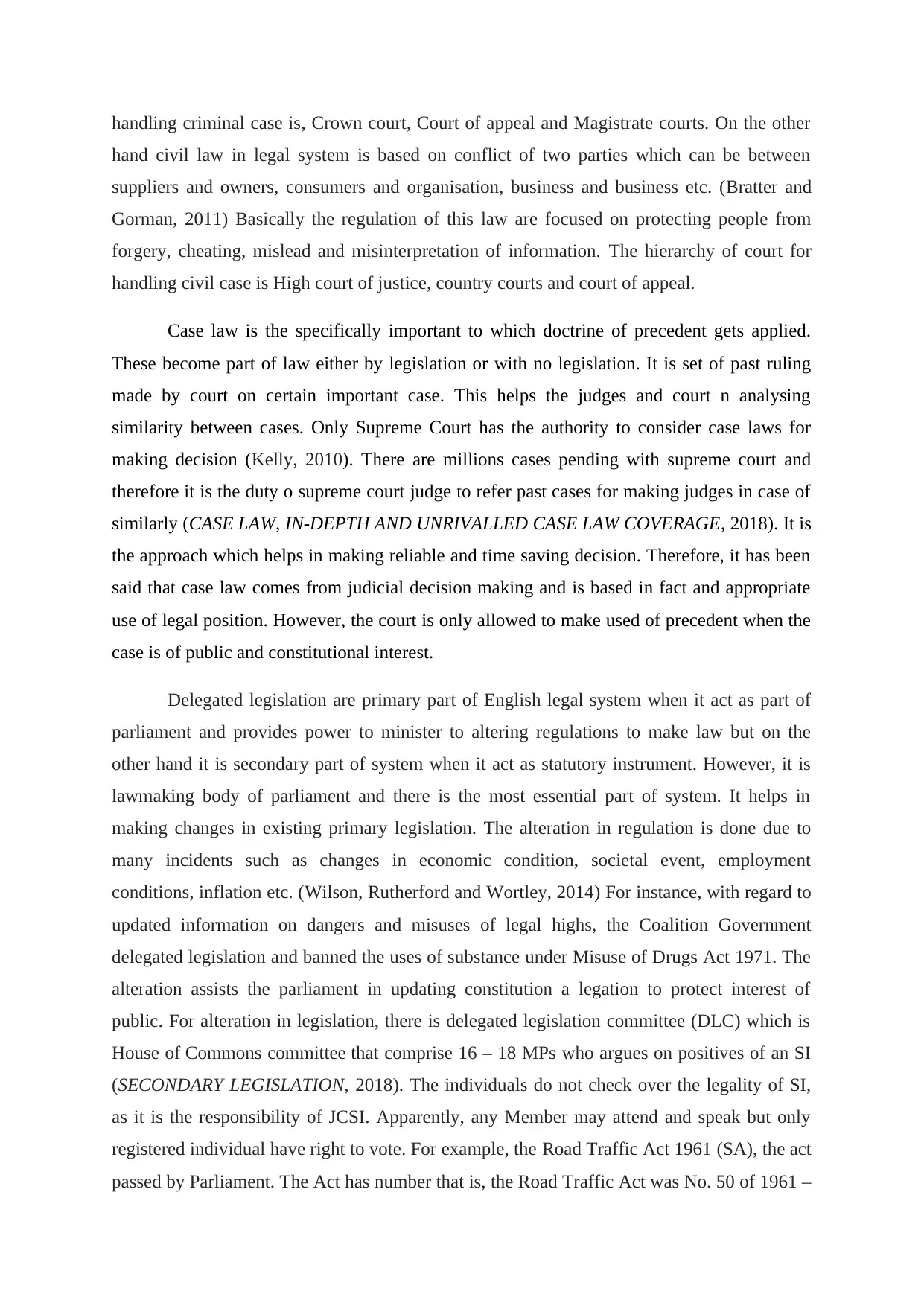
handling criminal case is, Crown court, Court of appeal and Magistrate courts. On the other
hand civil law in legal system is based on conflict of two parties which can be between
suppliers and owners, consumers and organisation, business and business etc. (Bratter and
Gorman, 2011) Basically the regulation of this law are focused on protecting people from
forgery, cheating, mislead and misinterpretation of information. The hierarchy of court for
handling civil case is High court of justice, country courts and court of appeal.
Case law is the specifically important to which doctrine of precedent gets applied.
These become part of law either by legislation or with no legislation. It is set of past ruling
made by court on certain important case. This helps the judges and court n analysing
similarity between cases. Only Supreme Court has the authority to consider case laws for
making decision (Kelly, 2010). There are millions cases pending with supreme court and
therefore it is the duty o supreme court judge to refer past cases for making judges in case of
similarly (CASE LAW, IN-DEPTH AND UNRIVALLED CASE LAW COVERAGE, 2018). It is
the approach which helps in making reliable and time saving decision. Therefore, it has been
said that case law comes from judicial decision making and is based in fact and appropriate
use of legal position. However, the court is only allowed to make used of precedent when the
case is of public and constitutional interest.
Delegated legislation are primary part of English legal system when it act as part of
parliament and provides power to minister to altering regulations to make law but on the
other hand it is secondary part of system when it act as statutory instrument. However, it is
lawmaking body of parliament and there is the most essential part of system. It helps in
making changes in existing primary legislation. The alteration in regulation is done due to
many incidents such as changes in economic condition, societal event, employment
conditions, inflation etc. (Wilson, Rutherford and Wortley, 2014) For instance, with regard to
updated information on dangers and misuses of legal highs, the Coalition Government
delegated legislation and banned the uses of substance under Misuse of Drugs Act 1971. The
alteration assists the parliament in updating constitution a legation to protect interest of
public. For alteration in legislation, there is delegated legislation committee (DLC) which is
House of Commons committee that comprise 16 – 18 MPs who argues on positives of an SI
(SECONDARY LEGISLATION, 2018). The individuals do not check over the legality of SI,
as it is the responsibility of JCSI. Apparently, any Member may attend and speak but only
registered individual have right to vote. For example, the Road Traffic Act 1961 (SA), the act
passed by Parliament. The Act has number that is, the Road Traffic Act was No. 50 of 1961 –
hand civil law in legal system is based on conflict of two parties which can be between
suppliers and owners, consumers and organisation, business and business etc. (Bratter and
Gorman, 2011) Basically the regulation of this law are focused on protecting people from
forgery, cheating, mislead and misinterpretation of information. The hierarchy of court for
handling civil case is High court of justice, country courts and court of appeal.
Case law is the specifically important to which doctrine of precedent gets applied.
These become part of law either by legislation or with no legislation. It is set of past ruling
made by court on certain important case. This helps the judges and court n analysing
similarity between cases. Only Supreme Court has the authority to consider case laws for
making decision (Kelly, 2010). There are millions cases pending with supreme court and
therefore it is the duty o supreme court judge to refer past cases for making judges in case of
similarly (CASE LAW, IN-DEPTH AND UNRIVALLED CASE LAW COVERAGE, 2018). It is
the approach which helps in making reliable and time saving decision. Therefore, it has been
said that case law comes from judicial decision making and is based in fact and appropriate
use of legal position. However, the court is only allowed to make used of precedent when the
case is of public and constitutional interest.
Delegated legislation are primary part of English legal system when it act as part of
parliament and provides power to minister to altering regulations to make law but on the
other hand it is secondary part of system when it act as statutory instrument. However, it is
lawmaking body of parliament and there is the most essential part of system. It helps in
making changes in existing primary legislation. The alteration in regulation is done due to
many incidents such as changes in economic condition, societal event, employment
conditions, inflation etc. (Wilson, Rutherford and Wortley, 2014) For instance, with regard to
updated information on dangers and misuses of legal highs, the Coalition Government
delegated legislation and banned the uses of substance under Misuse of Drugs Act 1971. The
alteration assists the parliament in updating constitution a legation to protect interest of
public. For alteration in legislation, there is delegated legislation committee (DLC) which is
House of Commons committee that comprise 16 – 18 MPs who argues on positives of an SI
(SECONDARY LEGISLATION, 2018). The individuals do not check over the legality of SI,
as it is the responsibility of JCSI. Apparently, any Member may attend and speak but only
registered individual have right to vote. For example, the Road Traffic Act 1961 (SA), the act
passed by Parliament. The Act has number that is, the Road Traffic Act was No. 50 of 1961 –
⊘ This is a preview!⊘
Do you want full access?
Subscribe today to unlock all pages.

Trusted by 1+ million students worldwide
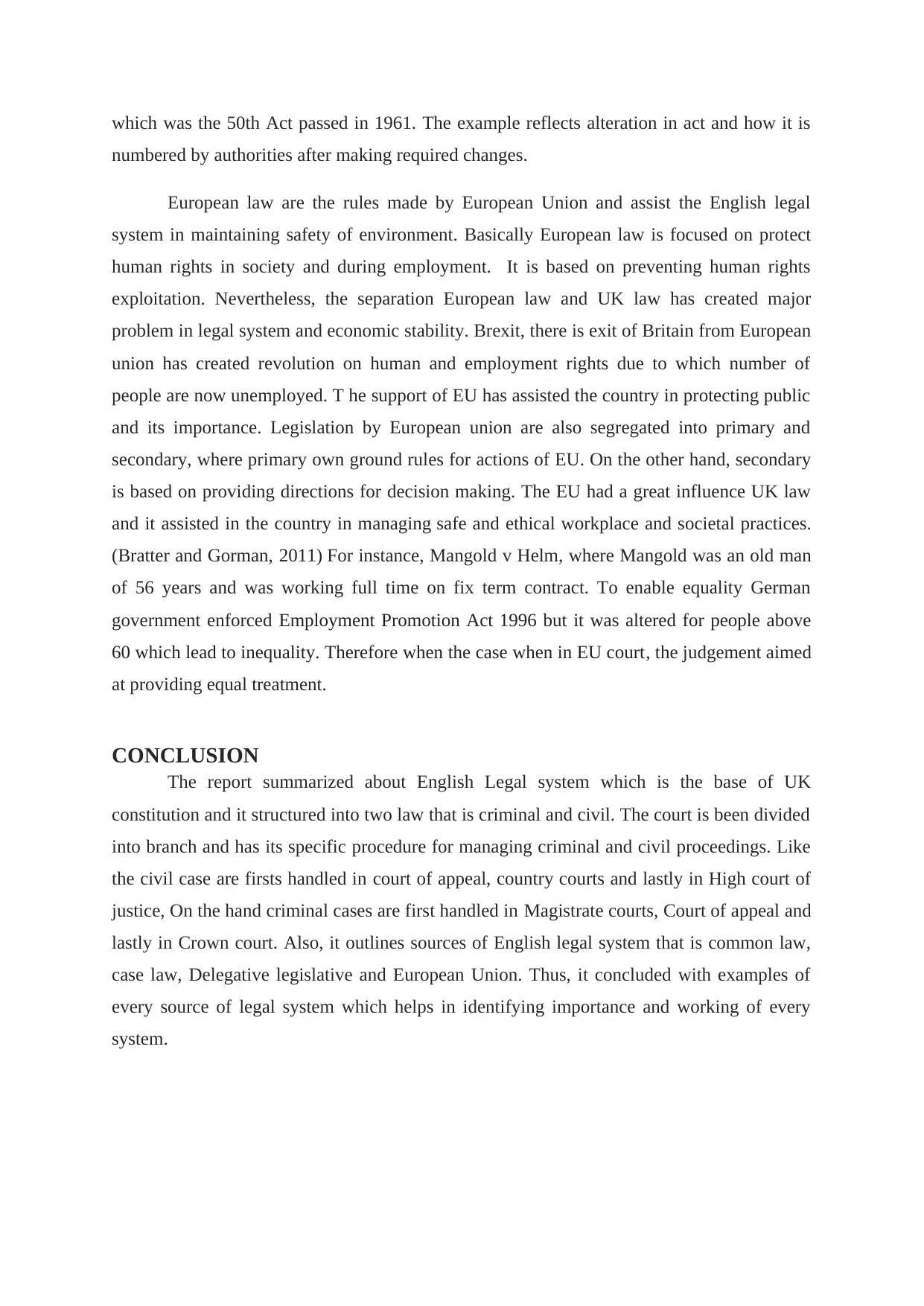
which was the 50th Act passed in 1961. The example reflects alteration in act and how it is
numbered by authorities after making required changes.
European law are the rules made by European Union and assist the English legal
system in maintaining safety of environment. Basically European law is focused on protect
human rights in society and during employment. It is based on preventing human rights
exploitation. Nevertheless, the separation European law and UK law has created major
problem in legal system and economic stability. Brexit, there is exit of Britain from European
union has created revolution on human and employment rights due to which number of
people are now unemployed. T he support of EU has assisted the country in protecting public
and its importance. Legislation by European union are also segregated into primary and
secondary, where primary own ground rules for actions of EU. On the other hand, secondary
is based on providing directions for decision making. The EU had a great influence UK law
and it assisted in the country in managing safe and ethical workplace and societal practices.
(Bratter and Gorman, 2011) For instance, Mangold v Helm, where Mangold was an old man
of 56 years and was working full time on fix term contract. To enable equality German
government enforced Employment Promotion Act 1996 but it was altered for people above
60 which lead to inequality. Therefore when the case when in EU court, the judgement aimed
at providing equal treatment.
CONCLUSION
The report summarized about English Legal system which is the base of UK
constitution and it structured into two law that is criminal and civil. The court is been divided
into branch and has its specific procedure for managing criminal and civil proceedings. Like
the civil case are firsts handled in court of appeal, country courts and lastly in High court of
justice, On the hand criminal cases are first handled in Magistrate courts, Court of appeal and
lastly in Crown court. Also, it outlines sources of English legal system that is common law,
case law, Delegative legislative and European Union. Thus, it concluded with examples of
every source of legal system which helps in identifying importance and working of every
system.
numbered by authorities after making required changes.
European law are the rules made by European Union and assist the English legal
system in maintaining safety of environment. Basically European law is focused on protect
human rights in society and during employment. It is based on preventing human rights
exploitation. Nevertheless, the separation European law and UK law has created major
problem in legal system and economic stability. Brexit, there is exit of Britain from European
union has created revolution on human and employment rights due to which number of
people are now unemployed. T he support of EU has assisted the country in protecting public
and its importance. Legislation by European union are also segregated into primary and
secondary, where primary own ground rules for actions of EU. On the other hand, secondary
is based on providing directions for decision making. The EU had a great influence UK law
and it assisted in the country in managing safe and ethical workplace and societal practices.
(Bratter and Gorman, 2011) For instance, Mangold v Helm, where Mangold was an old man
of 56 years and was working full time on fix term contract. To enable equality German
government enforced Employment Promotion Act 1996 but it was altered for people above
60 which lead to inequality. Therefore when the case when in EU court, the judgement aimed
at providing equal treatment.
CONCLUSION
The report summarized about English Legal system which is the base of UK
constitution and it structured into two law that is criminal and civil. The court is been divided
into branch and has its specific procedure for managing criminal and civil proceedings. Like
the civil case are firsts handled in court of appeal, country courts and lastly in High court of
justice, On the hand criminal cases are first handled in Magistrate courts, Court of appeal and
lastly in Crown court. Also, it outlines sources of English legal system that is common law,
case law, Delegative legislative and European Union. Thus, it concluded with examples of
every source of legal system which helps in identifying importance and working of every
system.
Paraphrase This Document
Need a fresh take? Get an instant paraphrase of this document with our AI Paraphraser
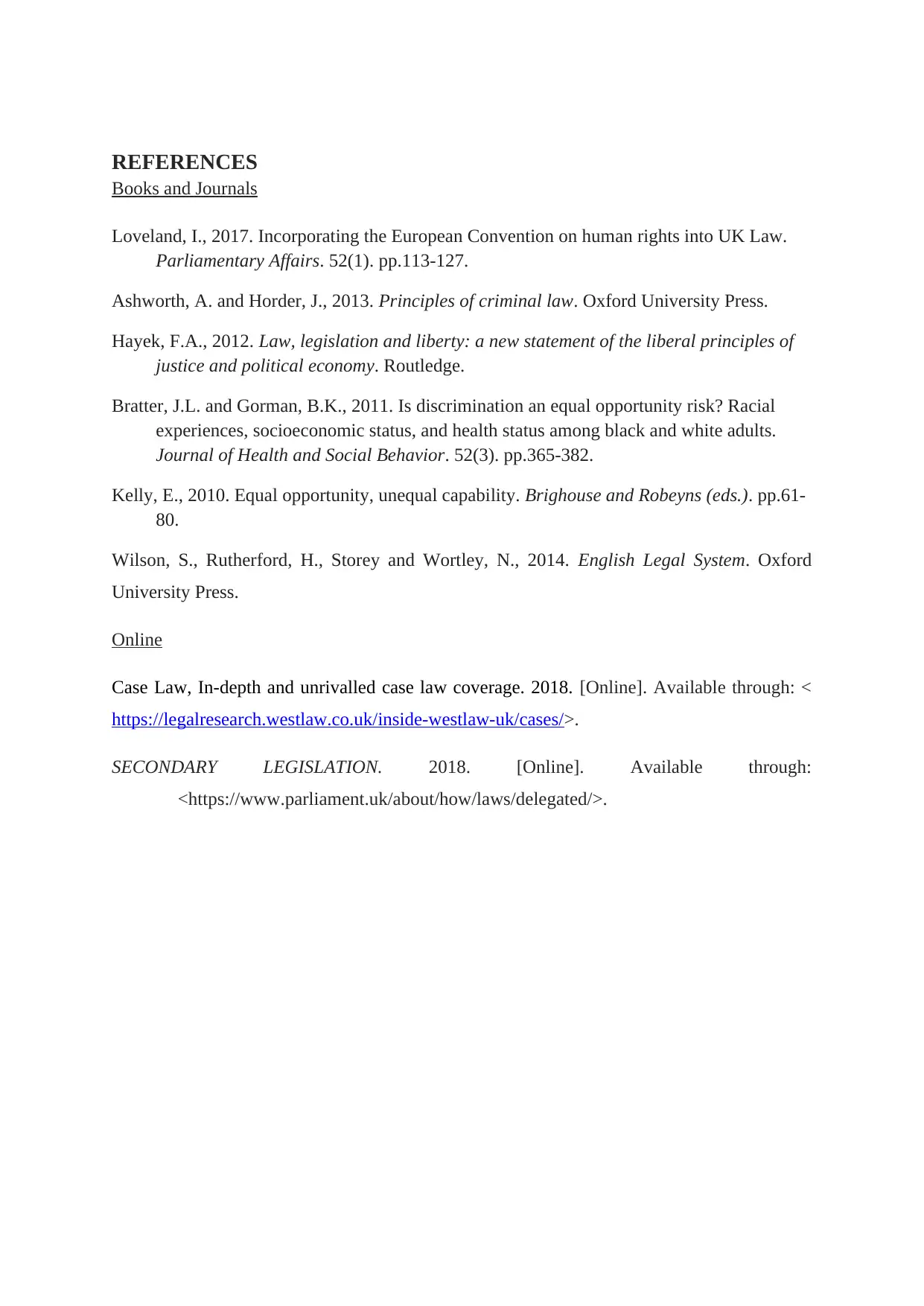
REFERENCES
Books and Journals
Loveland, I., 2017. Incorporating the European Convention on human rights into UK Law.
Parliamentary Affairs. 52(1). pp.113-127.
Ashworth, A. and Horder, J., 2013. Principles of criminal law. Oxford University Press.
Hayek, F.A., 2012. Law, legislation and liberty: a new statement of the liberal principles of
justice and political economy. Routledge.
Bratter, J.L. and Gorman, B.K., 2011. Is discrimination an equal opportunity risk? Racial
experiences, socioeconomic status, and health status among black and white adults.
Journal of Health and Social Behavior. 52(3). pp.365-382.
Kelly, E., 2010. Equal opportunity, unequal capability. Brighouse and Robeyns (eds.). pp.61-
80.
Wilson, S., Rutherford, H., Storey and Wortley, N., 2014. English Legal System. Oxford
University Press.
Online
Case Law, In-depth and unrivalled case law coverage. 2018. [Online]. Available through: <
https://legalresearch.westlaw.co.uk/inside-westlaw-uk/cases/>.
SECONDARY LEGISLATION. 2018. [Online]. Available through:
<https://www.parliament.uk/about/how/laws/delegated/>.
Books and Journals
Loveland, I., 2017. Incorporating the European Convention on human rights into UK Law.
Parliamentary Affairs. 52(1). pp.113-127.
Ashworth, A. and Horder, J., 2013. Principles of criminal law. Oxford University Press.
Hayek, F.A., 2012. Law, legislation and liberty: a new statement of the liberal principles of
justice and political economy. Routledge.
Bratter, J.L. and Gorman, B.K., 2011. Is discrimination an equal opportunity risk? Racial
experiences, socioeconomic status, and health status among black and white adults.
Journal of Health and Social Behavior. 52(3). pp.365-382.
Kelly, E., 2010. Equal opportunity, unequal capability. Brighouse and Robeyns (eds.). pp.61-
80.
Wilson, S., Rutherford, H., Storey and Wortley, N., 2014. English Legal System. Oxford
University Press.
Online
Case Law, In-depth and unrivalled case law coverage. 2018. [Online]. Available through: <
https://legalresearch.westlaw.co.uk/inside-westlaw-uk/cases/>.
SECONDARY LEGISLATION. 2018. [Online]. Available through:
<https://www.parliament.uk/about/how/laws/delegated/>.
1 out of 8
Related Documents
Your All-in-One AI-Powered Toolkit for Academic Success.
+13062052269
info@desklib.com
Available 24*7 on WhatsApp / Email
![[object Object]](/_next/static/media/star-bottom.7253800d.svg)
Unlock your academic potential
Copyright © 2020–2026 A2Z Services. All Rights Reserved. Developed and managed by ZUCOL.



